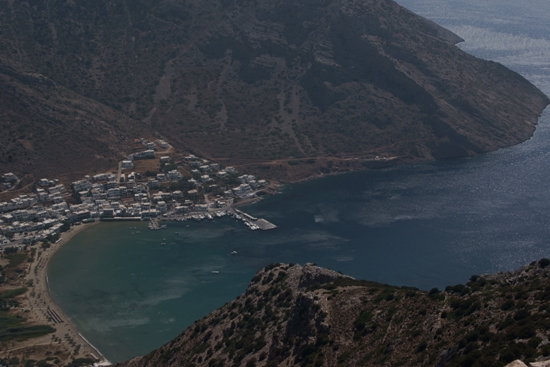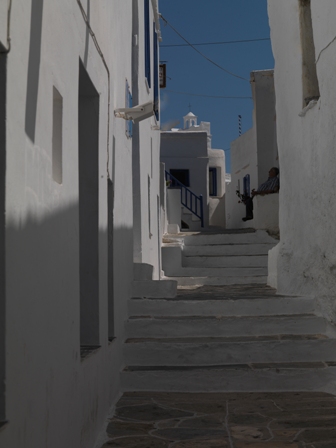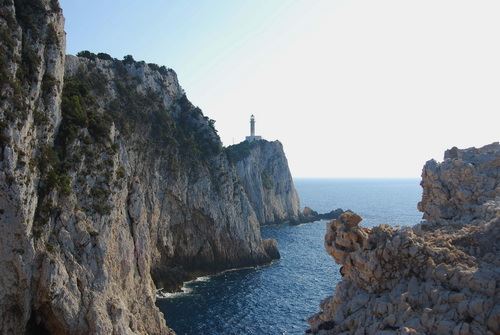
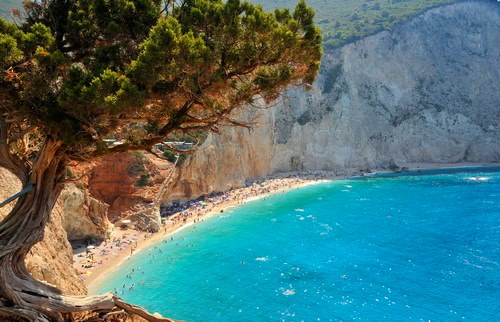
I was born on Lefkas, an island located between Italy and mainland Greece in the deep blue Ionian Sea. Lekada, as it is known in Greece, is one of seven islands that comprise the complex of the Ionian Islands and is situated a few kilometers south of cosmopolitan Corfu.
For me, my island has always been the center of the universe, the navel of the earth. I saw the light of day in the streets of its capital, the town of Lefkas. It is here where I ran and danced and suffered my share of cuts and bruises playing in the neighborhoods inhabited by the most welcoming and adorable people.
Lefkada town is all about magic. Entering the island by car over a movable bridge, you get the feeling that, with one snap of the fingers, you're back on the mainland. As you cross the bridge onto the island, you find yourself on a causeway with the azure blue sea on your left and the grayish waters of the lagoon on your right. The view remains etched in the mind of the visitor, creating an unforgettable first impression.
A little further down, the capital rises up with its brightly colored houses and their red and yellow roofs forming a lovely palette. The town, surrounded by the sea and the lagoon, sports a crowded western pier teeming with trendy bars while that on the east side is home to traditional tavernas and ouzeries offering up wonderful local specialties.
It is fringed by the beach of St. John, a unique stretch of all-white sand several kilometers long that is ideal for swimming and partaking in watersports. Here, amidst the refurbished windmills, you can sip the local sweet almond drink, or "soumada," while admiring the incomparable sunset in the soft dusk of summer or experience the twilight rising beyond the cliff side mansion of the Stavros family.
The eastern side of the island has the privilege of standing directly across the mountains of Aetoloakarnania, on the Greek mainland, that paint its waters with their golden colors. Small beaches and fishing villages adorn the winding coastal road, providing the visitor with a wonderful view of the small, "fjord-like" coastline.
Immediately south lies the town of Lygia, with its numerous fishing boats, and the village of Nikiana, with its many small, accessible beaches of pure, white sand. Further along, you find Perigiali, with its little bays, and Vlycho with its spectacular inlet resting beneath a tall, green mountain and offering one of the finest examples of the island's beauty.
A stop at Nidri, the cosmopolitan resort of Lefkada, is a must. Once a quaint fishing village, the town thrived in step with the persona of Aristotle Onassis who purchased the neighboring mythical Scorpios Island in 1963, married Jackie Kennedy five years later and transformed Lefkada into a playground for the rich. Legendary for his international "jetset" parties, Onassis also owned the adjacent, smaller island of Sparti which he used as a hunting ground to entertain his famous friends.
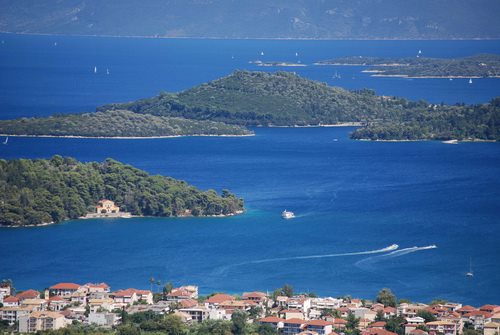
Today, Nidri is reliving moments of past glory as Russian oligarch, Dmitry Rybolovlev, who recently bought Scorpios from Onassis' grand-daughter, Athena, begins preparing this exclusive paradise to receive elite company once again. Purchasing the bulk of his supplies and renovation materials from local Nidri shops, Rybolovlev plans to restore the beautiful homes on the island while, in turn, giving a boost to the local economy.
Eastward, the shoreline passes Sivota, a sheltered bay of staggering beauty, where the clear waters reflect the view of the surrounding mountains. Continuing on, bypassing numerous small, landlocked villages, you arrive at vibrant Vassiliki, at the southern tip of the island. Strictly a commercial port in the pre-war years, Vassiliki is, today, the offloading point for the large ferries crossing daily from Cephalonia loaded with toursists. Here-in sits the small hamlet of Ponti which is famed for its stiff breezes and has become an international meeting place for champion windsurfers and sailboaters.
On its western shore, Lefkada offers spectacular views and wild seas. Following the road from the village of Agios Petros, down towards the stunning Athani and past Exantheia, you can gaze as far as the eye can see, far beyond the deep, blue color of the Ionian Sea. Snaking along the coast, you come to Agios Nikitas, where you can walk the cobbled streets of this picturesque fishing village, breathe in the saltiness of the water and stroll along its beautiful, rocky beach.
Dancing among a panoply of beaches on the way back to Lefkada town, you can discover the renowned Porto Katsiki with its turquoise sea, the stunning Ekremnous with their open waters, the expansive Kathisma with its ivory sand and cosmopolitan bars and the calm, more remote Peukakia.
If you're a the true sea lover, hire a sloop to sail around the Island and admire the cape of IRAS with its quaint monastery and bathe in one of the countless virgin beaches.
Before departing, do not forget that you have a duty to visit the monastery of Phaneromeni, perched on the hill, high above the capital, guarding the precious image of the Virgin Mary and giving hope to the weak and courage to the strong.
Should you enjoy the journey, you will want return to the magical island of ancient Pegasus, again and again, as many have before you, to get to know the locals and become acquainted with a new Greek generation of Dorians and Ionians.
Follow Justine Frangouli-Argyris on Twitter: www.twitter.com/Justinakion



